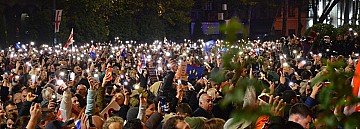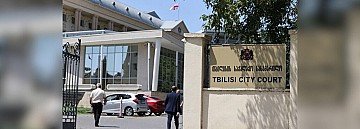- Following the announcement of the Georgian government to suspend the negotiations over Georgia’s European Union membership and rigged Parliamentary Elections of October 26, 2024, tens of thousands of protesters gathered in Tbilisi and all across Georgia to protest against the decision. The Georgian police and special forces brutally dispersed the protests.
- The International Federation for Human Rights (FIDH) and its Georgian member organisation, the Human Rights Center (HRC), urge the Georgian authorities to refrain from the unlawful use of force against protesters, and to promptly, effectively and impartially investigate all cases of police violence.
Tbilisi, Paris, 3 December 2024. On 28 November, unprecedented protests erupted across Georgia following the government’s announcement to suspend the negotiations over Georgia’s accession to the European Union. While the protests remained overwhelmingly peaceful, with tens of thousands of protesters gathering on Rustaveli Avenue in Georgia’s capital Tbilisi, and other cities, the police used water cannons, tear gas, and rubber bullets to disperse the crowds. Videos disseminated on social media show law enforcement officers brutally attacking unarmed protesters, and journalists. Media reports suggest that in some cases, law enforcement officers acted in revenge, chasing down, and arresting protesters far away from the protest sites.
"The use of force against peaceful protesters was completely disproportionate", stated Ucha Nanuashvili, FIDH Vice-President and founder of the Human Rights Center. "The violence against media representatives and interference in their journalistic activities were particularly alarming. In accordance with the unofficial data, on November 29 and 30, at least 30 journalists became victims of physical violence. Besides that, their equipment was purposefully damaged".
According to Georgia’s Ministry of Internal Affairs, as of 30 November, 27 protesters were hospitalised, and over 100 protesters had been arrested since the start of the demonstrations on 28 November. However, these figures are likely significantly higher, with the Human Rights Center having documented over 220 protesters arrested, 34 protesters subjected to administrative arrest, and 36 persons fined.
Although law enforcement officers allegedly committed similar criminal offenses during the mass demonstrations against the Russia-inspired "foreign agents" law in April and May 2024, no perpetrators have been identified or held responsible yet, creating a dangerous precedent for further unlawful violence.
"Over the recent months, the Georgian authorities have introduced several highly repressive laws inspired by Russia, such as the ‘foreign agents’ legislation, as well as a widely criticised law targeting the LGBTQI+ community", said Natalia Morozova, Head of the Eastern Europe/Central Asia Desk. "We are witnessing the spread of the worst Russian practices, both legislative, and law enforcement-related, which is a cause for significant concern".
FIDH and its Georgian member organization, the Human Rights Center, urge the Georgian authorities to refrain from violence against protesters, fully ensuring the right to peaceful assembly and the right to freedom from torture and ill-treatment, and to thoroughly and impartially investigate all cases of police violence, holding those responsible to account.
FIDH and the Human Rights Center also urge international organisations to take note of the human rights violations in Georgia, and to intensify pressure on the Georgian authorities to address the situation, and ensure that all those responsible are brought to justice.


